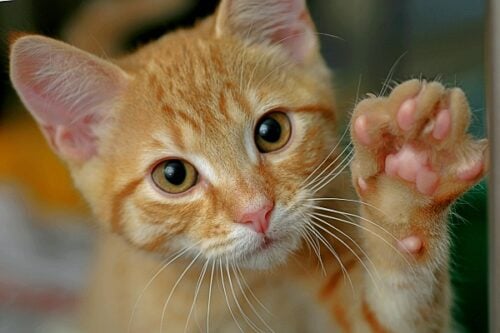Did you know cats have whiskers on the backs of their front legs? Take a look at your cat’s forearms, and you’ll notice a few small tactile hairs growing on them. These are called carpal vibrissae as in the Greek carpus, meaning wrist.
In this article, you’ll learn what whiskers are for, do cats like their whiskers touched, and why do cats have whiskers on their legs.

Table of Contents
- Do cats really use their whiskers to measure space?
- Why do cats have whiskers on the back of your front legs?
- Do cats like your whiskers touched?
Do cats really use their whiskers to measure space?
Before we answer that, let’s explore what cat whiskers are and what they do. A cats whisker are thick hairs growing inside a hair follicle. They are a sensory organ even though they don’t have nerves inside them, but where the whiskers originates from, is filled with nerve endings. But they aren’t regular hair. Their main function is to detect movements. And they are very good at it.
Whiskers are so sensitive that even tiny air currents can be detected by facial whiskers. This helps your cat when hunting, navigating, and measurement taking. It’s one big part of how they perceive the world around them.
However, cat’s don’t measure openings with their carpal whiskers which are the ones on the underside of your cats wrists. Their main function (likely not the only one) must be associated with hunting.
Scientists added electrodes to cats nerves, sending signals from their leg whiskers to their brain and found that cats are exceptionally good at detecting direction and the strength of the movement of an object they are holding.
Why do cats have whiskers on the back of your front legs?
Your cats whiskers on their legs turn out to be irreplaceable aids for them during hunting.
Have you seen a hockey goalie covering a puck and then looking around in a panic? That is because he (or she) is not able to see through their glove and must reassure themself that the puck isn’t on the loose.
It’s the same for a cat who covers a mouse with his paws. They are no longer able to see their prey, but they can feel it. You could say a hockey goalie would be thankful for a glove that had a few whiskers inside of it.
Cat whiskers detect even tiny moments of their prey. They help to check whether the prey is dead or alive, and if or how it is moving.

A similar thing happens when a cat is holding prey in their mouth which is too close for their eyes to observe fully.
Carpal whiskers on forearms are crucial for cats living outdoors and catching food for themselves. Indoor cats don’t hunt as they get their food served to them. Does this mean they don’t need whiskers on their forearms?
The significance of forearm whiskers is of course, less for indoor cats. But make no mistake, they still use them. How can you tell? The next time you play with your cat, let them pounce on a toy on a string and let them hold it under their paws. Then, try to pull the string lightly as if the toy is attempting an escape. You’ll see that your cat realigns their grasp according to sensations they receive from their leg whiskers.
Do cats like your whiskers touched?
Yes and no. Some cats don’t mind if you touch their whiskers, some absolutely will hate it. A cat whisker itself doesn’t have any nerve endings or other sensory characteristics. The base of the whisker is where the sensory organ is. This also means they are incredibly sensitive, almost like your cat has a form of radar.They are really specialized hair. This means if your cat accidentally has one of their whiskers cut by accident, it doesn’t hurt and will eventually grow back. Like eyebrows, it will take more time than regular hair. That said, these are very important to your cats ability to detect what is going on around them so be careful when brushing your cats arms.
One of our cats actually likes us to stroke their facial whiskers where one of our other cats really reacts negatively if we do that. That meant their food and water bowls had to be big enough so their facial whiskers didn’t touch the sides. So don’t be surprised if your cat doesn’t love you touching their whiskers on their face or arms.
You have now learned what whiskers are for, do cats like their whiskers touched, and why do cats have whiskers on their legs. This will go a long way towards a happy and healthy life together with your pet cat. And keeping your Pet Happy is what we all want.
